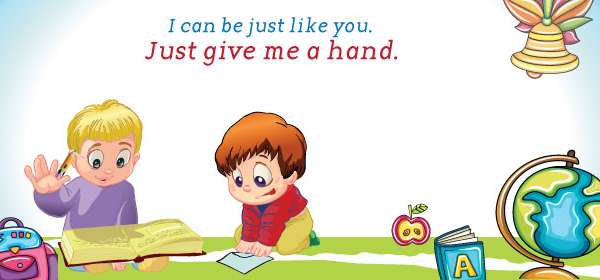
The Basics Of Learning Disabilities
5 Oct 2015 | 4 min Read
Malika Mehta
Author | 2 Articles
Over the years, in my capacity as a special educator and a teacher in a mainstream school in Mumbai, I have found that when people talk about Learning Disabilities, they often have what we call partial knowledge. This limited information then evolves into several preconceived notions of what a learning disability is and how a child with a learning disability will be. And finally, these per-determined ideas, lead to, us adults changing the ways in which we speak about and behave with different kinds of children, especially those who do not fit into the mould that we have laid out for them. This however does not lead to a healthy environment for children to grow up in. Moreover, it is easily changeable, if we can debunk a few common misconceptions about Specific Learning Disabilities.
MISCONCEPTION #1: Children with Learning Disabilities are not very intelligent and cannot learn.
This is ABSOLUTELY untrue!
In fact, by definition, children with a learning disability must have average to above average intelligence, as measured using a standardized IQ test. Contrary to what most people think, many studies have indicated that about one third of students with Learning Disabilities are also gifted.
So what does a learning disability mean for children then? It simply means that these students learn differently from their peers; in other words, their brains either receive/acquire, process/integrate or express information differently than other children in their class. Therefore, with proper identification and appropriate and timely intervention, students with Learning Disabilities CAN learn and succeed not only in school, but also in their adult lives as responsible citizens.
MISCONCEPTION #2: Children with Learning Disabilities are just lazy, irresponsible or unmotivated.
This statement could not be further from the truth!
In my experience, children with Learning Disabilities tend to be some of the most hardworking children that I have seen. I have heard so many parents describe their children saying, “She works so hard, yet there is no difference in her grades.” In fact, this kind of statement is one of the tell-tale signs that a Psychologist or Special Educator looks for when assessing a child for a Specific Learning Disability.
Sometimes, older children with Learning Disabilities tend to act out when asked to do specific tasks; this however, is their attempt at communicating that the work is too hard for them NOT that they are being lazy, irresponsible or are unmotivated. Most likely, these children have tried to do this type of work several times in the past, but have been unsuccessful at overcoming their difficulties, possibly because they have not been taught in a way that they can learn efficiently. As a result of having done the same work repeatedly in the same futile manner, they have finally become so discouraged, that they have learn that it is easier to misbehave and be the ‘joker’ of the class than be “the child that cannot learn!”
MISCONCEPTION #3: The teacher is just picking on my child and/or I can wait and it will get better or go away as s/he gets older.
No she is not and please don’t wait.
When a teacher takes the time out from her busy schedule to call you in to tell you that your child is not on par with his or her peers in a few areas, nine and a half times out of ten, they are genuinely concerned. Often they will tell you what is wrong, but not how to correct it; this is probably because they too are at a loss and don’t know what to do! Another sign, that you may need to consider looking at is – getting your child some more specialized learning.
Almost every research study done in this area advocates early intervention. No time is too soon. If you notice that your child is not doing something s/he should be doing by that age or grade, however young s/he may be, and despite all your efforts to help him or her, please do not wait to see a Developmental Pediatrician. The sooner you seek help for your child, the easier it is for him or her. The longer you wait, the harder it gets, as academic expectations only increase with every passing year, even when your child is just three and in Nursery!
Having said what I just did, I’m sure the next question that many of you have now is, “What are the signs?” or “What do I look for?” Stay tuned for the next article in this series to learn more.
Also read more about How can parents identify special needs in their child?
A


Suggestions offered by doctors on BabyChakra are of advisory nature i.e., for educational and informational purposes only. Content posted on, created for, or compiled by BabyChakra is not intended or designed to replace your doctor's independent judgment about any symptom, condition, or the appropriateness or risks of a procedure or treatment for a given person.
